Where did you go on vacation知识讲解和练习题〔优秀篇〕
Where did you go on vacation 知识详解-英语八年级上册(人教版)
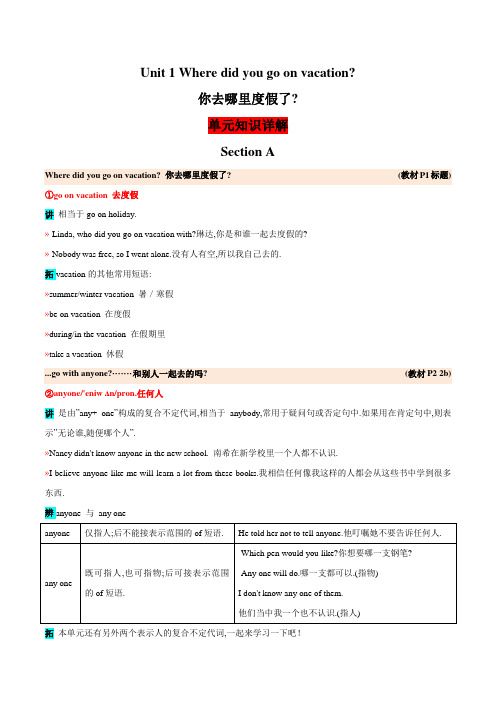
Unit 1 Where did you go on vacation?你去哪里度假了?单元知识详解Section AWhere did you go on vacation? 你去哪里度假了? (教材P1标题) ①go on vacation 去度假讲相当于go on holiday.»-Linda, who did you go on vacation with?琳达,你是和谁一起去度假的?»-Nobody was free, so I went alone.没有人有空,所以我自己去的.拓vacation的其他常用短语:»summer/winter vacation 暑/寒假»be on vacation 在度假»during/in the vacation 在假期里»take a vacation 休假...go with anyone?·······和别人一起去的吗? (教材P2 2b) ②anyone/'eniwʌn/pron.任何人讲是由”any+ one”构成的复合不定代词,相当于anybody,常用于疑问句或否定句中.如果用在肯定句中,则表示”无论谁,随便哪个人”.»Nancy didn't know anyone in the new school. 南希在新学校里一个人都不认识.»I believe anyone like me will learn a lot from these books.我相信任何像我这样的人都会从这些书中学到很多东西.辨anyone 与any one拓本单元还有另外两个表示人的复合不定代词,一起来学习一下吧!典例1 (泰州中考改编)-Is there________ in the classroom?-It's empty(空的).________ is listening to a speech in the school hall.A. anyone; AnyoneB. anyone; EveryoneC. everyone; AnyoneD. everyone; Everyone解析:句意:"教室里有人吗?""教室里没人,所有人都在学校礼堂听演讲."第一空表示"有人,任何人",且该句为疑问句,应用anyone;第二空表示"所有人”,且位于句首,应用Everyone.故选B.Oh, did you go anywhere interesting?噢,你去什么有意思的地方了吗? (教材P2 2d) ③anywhere/'eniweə/,/'eniwer/adv.在任何地方讲地点副词,常用于否定句和疑问句中,代替somewhere.如果用在肯定句中,则表示"无论何处,随便哪个地方".»I can't find my pen anywhere.我到处都找不到我的钢笔.»You can buy clothes like these anywhere.这样的衣服到处都可以买到拓含where的其他地点副词;典例2(云南中考改编)-Hello, Jenny. I can't find my math book________. Did you see it?-Sorry, I didn't.A. anywhereB. somewhereC. nowhere解析:句意:"你好,珍妮.我到处都找不到我的数学书.你看到它了吗?""抱歉,我没看到."根据"Did you see it?"可知,说话者找不到数学书,否定句中应用anywhere.故选A.It was wonderful!它太美了!(教材P2 2d) ④wonderful/'wʌndə(r)fl/adj.精彩的;绝妙的讲由"wonder(n.惊叹;惊奇)+-ful(形容词后缀)"构成.»What a wonderful 4-D film it is!多么精彩的一部4D电影啊!词缀学习-ful可用于构成形容词,意为"充满······的;有·····性质(或倾向)的”,其反义词缀为" -less".如:»care (n. 小心) +-ful=careful(adj.小心点,仔细的)»care (n. 小心) +-less=careless(adj.粗心的,不仔细的)»help(n.帮助)+-ful=helpful(adj.有帮助的)»help(n.帮助)+-less=helpless(adj.无助的)»use(n.用途)+-ful=useful(adj.有用的)»use(n.用途)+-less=useless(adj.无用的)We took quite a few photos there.我们在那里拍了很多照片. (教材P2 2d) ⑤ quite a few 相当多;不少讲相当于many,修饰可数名词复数.»Quite a few students took part in the sports meeting held in our school.很多学生参加了在我们学校举办的运动会.拓quite a little相当多;不少相当于much,修饰不可数名词.»We had quite a little bread for breakfast.我们早餐吃了相当多的面包.What about you?你呢? (教材P22d) ⑥What about...?讲意为”·····呢?/······怎么样?",可与"How about...?"互换,其中about 为介词,后接名词、代词或动词-ing 形式.具体用法如下:(1)用来询问信息或情况.»-I'm a student. What about you?我是学生,你呢?»-What about the apples?这些苹果怎么样?-They're fresh.它们很新鲜.(2)用来向对方提出建议.»-We are free this Saturday. What about visiting the museum?本周六我们有空.参观博物馆怎么样?-Sounds great.听起来很棒.拓常用的表示提建议的句型还有;»Let's do sth.!我们做某事吧!»Why not do sth.?为什么不做某事呢?»Why don't you do sthi?.你为什么不做某事呢?»Shall we do sth.?我们做某事好吗?»Would you like sab./to do st.?你想要某物/做某事吗?»You'd better do sth,你最好做某事.典例3(2022·绥化中考)What about________ the song Together for a. Shared Future? Its name is the slogan(口号)of the Beijing 2022 Olympic Winter Games,A. singB. singingC. to sing解析:What about后的动词应用其-ing形式,故选B.I just stayed at home most of the time to read and relax.我大部分时间只是待在家里看书、休息. (教材P2 2d)⑦most/məust/ adj.,adv.& pron.最多;大多数讲(1)[代词]大多数可代指可数名词或不可数名词,常与of连用.»Most of my friends like pop music.我的大多数朋友喜欢流行音乐.»Most of the building is yellow.这座大楼的大部分是黄色的.(2)[形容词](数量上)最多,最大是many和much的最高级,后可跟可数名词复数或不可数名词.»Who do you think will get the most votes? 你认为谁会得到最多的选票?»Lingling gets the most money of the three.三个人当中玲玲得到的钱最多(3)[形容词]大多数,大部分后可跟可数名词复数或不可数名词.»Most people agree that honesty is a good thing.大多数人都认为诚实是一件好事.(4)[副词](程度上)最大/多/高用来修饰动词.»Jiaozi is what I miss most when I'm abroad.饺子是我在国外时最想念的食物.Yes, I bought something for my father.是的,我给我爸爸买了一些东西. (教材P3Grammar Focus) ⑧ something/'sam0mn/pron.某事;某物讲复合不定代词,常用于肯定句中.作主语时,谓语动词用单数形式.»Linda, I want to tell you something about the school trip.琳达,我想告诉你一些关于学校旅行的事情.»Something is wrong with my new computer.我的新电脑出故障了.拓含thing的其他复合不定代词:特别提醒在表示请求、建议或期望得到肯定回答的疑问句中,常用something,而不用anything.-Would you like something to drink, Judy? 你想要喝点什么吗,朱迪?-Yes, Some milk is OK.好的,一些牛奶就行.典例4(2022·常州中考)Learning is a lifelong journey, for it brings us_______ new every day,A. everythingB. nothingC. anythingD. something解析:由前半句"学习是终身的旅程"可推知,此处是说"因为它每天都给我们带来新的东西",故用something表示"某事/物”,选D.Everything tasted really good!所有的食物尝起来都很好吃!(教材P3 Grammar Focus) ⑨taste v.有····味道讲[连系动词]有······味道后接形容词作表语,通常不用于进行时.»She knows it's not good for her, but it tastes good!她知道这对她的健康不利,但它(冰激凌)很好吃拓(1)[及物动词]尝出»You can taste the garlic in this stew.在这炖菜里你可以尝出大蒜的味道.(2)[名词]味道;欣赏力»I like the taste of olives.我喜欢橄榄的味道.»Mary has good taste in clothes.玛丽在服装方面有很好的欣赏力.语境串记The cook tastes(v.品尝)the soup. Wow! It tastes(v.尝起来)delicious. It has a good taste(n.味道).厨师尝了尝汤.哇!它尝起来很美味.它的味道很好.归纳总结常用的表示感官的连系动词有:look看起来sound听起来feel摸起来smell有······气味taste有····味道典例5(2022·泸州中考)-Paul, have you tried this chicken? It's a special in Luzhou and has been introduced in the TV program A Bite of China.-Yes, it________ hot but delicious.A. eatsB. looksC. tastesD. sees解析:句意:"保罗,你尝过这种鸡吗?它是泸州的特色菜,在电视节目《舌尖上的中国》中也有介绍.””尝过,它很辣,但味道很好.”由"Paul,have you tried this chicken?"及其肯定回答”)”可知,保罗尝过这种鸡,此处应该是评Yes"可价其味道,故用tastes,选C. eat 和see 都是实义动词,后面不能接形容词.How did you like it?你觉得它怎么样? (教材P3.3a) ⑩ How do you like.,,?讲意为"你(们)觉得·····怎么样?",用于询问对方的观点或看法.其同义表达有:»What do you think of...?»How do you feel about...?»-How do you like this cup of Xinglong coffee?你认为这杯兴隆咖啡怎么样?-It tastes really great. I'd like another cup.它尝起来很不错.我想再来一杯.Of course!当然!(教材P3 3a) ⑪of course 当然;自然讲肯定答语,相当于sure/certainly.若表示"当然不",要用of course not.»-Can you help me to repair my computer?你能帮我修一下电脑吗?-Of course/Sure/Certainly,当然可以.»-It's cold outside. Would you mind closing the window?外面很冷,你介意关一下窗户吗?-Of course not, I will do it at once.当然不介意.我马上关.典例6 (扬州中考)-Are your parents against(反对)your leaving home to work in Shanghai?-________. They say there are more chances in big cities.A. Don't mention ifB. Of course notC. That's all rightD. With pleasure解析:Don't mention it"不客气";Of course not“当然不”;That's all right"没关系”:With pleasure"很乐意".问句句意;你的父母反对你离开家到上海工作吗?根据答句中的"他们说大城市的机会更多"可知,B项符合题意.I bought something for my parents ,but nothing for myself.我给我父母买了一些东西,但是什么也没给我自己买. (教材P33a) ⑫myself/mai'self/pron.我自己;我本人讲为反身代词,由"my+self"构成.»When I face difficulties, I always say to myself,”Never give up!"当我面临困难时,我总是对自己说:”永不放弃!”»I can discuss questions and express myself in simple English.我能用简单的英语讨论问题和表达自己.归纳总结反身代词的构成规律:特别提醒反身代词不能作主语,多用于动词或介词后作宾语,表示"某人自己".(all)by oneself意为"(某人)独自,单独".He learned to ride a bicycle by himself.他自己学会了骑自行车.典例7用所给词的适当形式填空.(2022·龙东中考)I always tell________(I) not to give up every time I fail.解析:句意;每次我失败的时候,我总是叮嘱自己不要放弃.空处与主语1人称相同,指代的是"我”,即"自己",应用反身代词,故填myself.The only problem was that there was nothing much to do in the evening but read.唯一的问题是晚上除了看书没有什么事可做. (教材P3 3b) ⑬ there's nothing to do but...除了······之外,没有什么事可做讲相当于"sb, has nothing to do but...".需要注意的是,在这两个结构中,当but前面有实义动词do时,but后通常用不带to的动词不定式;否则,用带to的动词不定式.»There was nothing to do yesterday afternoon but watch news on TV.昨天下午除了在电视上看新闻外,没有什么事可做.»I had nothing to say but to keep silent.我没有什么可说的,只有保持沉默.Still no one seemed to be bored.不过似乎没有人感到厌烦. (教材P3 3b) ⑭seem(to be)+n./adj.似乎·····;好像······»Tom seems(to be) a very clever boy.汤姆似乎是一个非常聪明的男孩.»Computers and rockets seemed impossible 100 years ago.100年前,计算机和火箭似乎是不可能的.拓seem的其他用法:(1)seem like+n.似乎······;好像·····»Jack seems like a good boy,杰克似乎是个好孩子.(2)lt-seems like+从句.似乎·····;仿佛······»It seems like everything has been greatly improved.似乎一切都得到了很大的改善.(3)seem to do sth.似乎做某事;好像做某事»You seem to get lost. Need help?你好像迷路了.需要帮助吗?(4)It seems/seemed+(that)从句看来好像/似乎······该句型通常可与seem to do sth.进行同义转换.»It seems that no one knows the news, =No one seems to know the news.似乎没有人知道那个消息.⑮bored/bo:(r)d/adj.厌倦的;烦闷的讲[形容词]be/feel/get bored with 对···感到厌烦»Finally, Steve felt too bored with the game.最后,史蒂夫十分厌烦这个游戏.辨bored 与boring语境串记Doing the boring housework makes me feel bored.做这些无聊的家务令我感到厌倦.归纳总结在英语中,以-ed结尾的形容词通常用来描述人,表示“感到······的”;以-ing结尾的形容词通常用来描述事物,表示“令人······的".常见的还有:典例8(黄石中考)In the future, robots will do________ jobs in place of people in order not to get us________.A, bored; bored B. boring; boring C. boring; bored D. bored; boring解析;句意;将来,为了不让我们感到厌倦,机器人将代替人们做令人厌烦的工作.第一空修饰jobs,表示"令人厌烦的",用boring;第二空描述人的主观感受,表示“厌倦的”,用bored.故选C.Section BWhat activities do you find enjoyable?你认为什么活动是有乐趣的? (教材P5 2a) ①activity/æk'tivəti/n.活动讲[可数名词]复数形式是变y为i再加-es,即activities.»Students should take part in many outdoor activities.学生们应该参加许多户外活动.②enjoyable/in'd3oəbl/adj.有乐趣的;令人愉快的讲[形容词]由"enjoy(v.享受······的乐趣;喜爱)+-able(形容词后缀)"构成.»Skipping is an enjoyable form of exercise.跳绳是一种有趣的锻炼方式.»For Tony, nothing is more enjoyable than playing tennis.对托尼来说,没有什么比打网球更令人愉快的了.拓与enjoy相关的词:»enjoy v.享受·····的乐趣;喜爱»enjoyable adj.有乐趣的;令人愉快的»enjoyment n.乐趣;乐事»enjoyably adv.令人愉快地词缀学习-able表示"可以······的;具有······性质的”,常加在某些动词或名词的后面,构成形容词.如:»comfort(n.舒适)+-able→ comfortable(adj.舒适的)»fashion(n. 时尚,时兴)→fashionable(adj.时髦的)It was sunny and hot, so we decided to go to the beach near our hotel.这里天气晴朗且炎热,因此我们决定去靠近旅馆的海滩. (教材P5 2b) ③decide/dr'said/v.决定;选定讲decide(not) to do sth.决定(不)做某事decide+"特殊疑问词+不定式"decide+宾语从句»He decided to help the people in need.他决定帮助那些需要帮助的人.»He cannot decide when to leave.他不能决定何时离开.»I can't decide where I should go.我不能决定我该去哪儿.拓decision[名词]决定;抉择»make a decision =decide 做决定»I made a decision(=decided) to read English every day,我决定每天读英语.典例1根据句意及首字母提示填写单词.(2022·自贡中考)After he thought twice, he d_______ to become a teacher in a poor village after college.答案:decidedMy sister and I tried paragliding.我和妹妹尝试了滑翔伞运动. (教材P5 2b)④ try/traɪ/v.&n.尝试;设法;努力(1)[及物动词]尝试;设法;努力后常接名词、代词、动词-ing或不定式作宾语.»He tried his fortune in another city.他在另一座城市碰碰运气.(2)[可数名词]尝试常用单数形式.»have a try/give it a try 试一试»She didn't manage to break the record, but it was a good try.她没能打破纪录,但这是一次很好的尝试.»That's not difficult. You can have a try.那不难,你可以试一下.辨try to do sth.与try doing sth.»They are trying to solve this problem.他们正在努力解决这个问题.»Tom is trying solving this problem in this way.汤姆正在尝试用这种方法解决这个问题典例2(江西中考)The food is very delicious in that restaurant. We could go and_________ it.A. sellB. helpC. produceD.try解析:句意:那家餐馆的食物非常美味.我们可以去尝试一下.Sell”卖”;help"帮助";produce"生产";try"尝试".根据语境可知选D.I felt like I was a bird.我感觉自己像一只鸟. (教材P5 2b)⑤ feel like 给······的感觉;感受到讲后常接名词、动词-ing或从句.»I feel like a fish in the sea.我感觉自己像大海里的一条鱼.»The 3-D film can make you feel like being in the real situation.3D 电影能给你一种处于真实环境的感觉.»He felt like he was a giant in the country of dwarfs.在侏儒国他感觉自己像个巨人.拓还可意为"想要".feel like sth./feel like doing sth.想要某物/想做某事»Do you feel like another drink?你想再喝一杯吗?»He slept badly and didn't feel like eating.他睡眠不好,并且不想吃东西.There are a lot of new buildings now, but many of the old buildings are still there.现在那里有许多新的建筑,但是很多古老的建筑依然存在. (教材P5 2b) ⑥ building/'bɪldɪŋ/n.建筑物;房子讲[可数名词]由"build(v.建造)+-ing(后缀)”构成.»There is an old building in front of our school.我们学校前面有一座旧建筑.拓build+-er→ builder n.建筑者,建筑工人build v建造,建筑building n.建筑物,房子builder n.建筑者语境串记Look! Some builders are working hard to build the tall building.看!一些建筑工人正在辛苦工作,建造那座高楼.I wonder what life was like here in the past.我想知道过去这里的生活是什么样子的. (教材P5 2b)⑦ wonder/'wʌndə(r)/v.想知道;琢磨高频讲[及物动词]相当于want to know.用法如下:wonder+"特殊疑问词+动词不定式"wonder+ who/what/how/when引导的宾语从句wonder+ if/whether引导的宾语从句»After reading so much, you may wonder how to make a book.读了这么多书之后,你可能想知道如何写一本书. »Rose is wondering who did the washing. 罗丝想知道谁洗了衣服.»They wonder if robots will think like a human in 25 to 50 years.他们想知道在25到50年后机器人是否会像人一样思考.拓还可作名词.惊讶,惊奇(不可数名词) 奇迹,奇观(可数名词)»I was listening to his story with wonder.我吃惊地听着他的故事.(不可数名词)»The Great Wall is one of the seven wonders around the world.长城是世界七大奇迹之一. (可数名词)I really enjoyed walking around the town.我很喜欢在这个镇上到处走走. (教材P5 2b)⑧enjoy v.喜爱;享受······的乐趣讲[及物动词]enjoy sth.喜欢某物enjoy doing sth.喜欢做某事enjoy oneself 玩得高兴;过得愉快»It(The library) is very quiet and I enjoy reading there.它(图书馆)非常安静,我喜欢在那里读书.»We enjoyed ourselves at the English party. Last weekend.我们在上周末的英语聚会上玩得很开心.典例3用所给词的适当形式填空.(2023·清华大学附属中学朝阳学校期中改编)My grandfather wants to travel around the world because he enjoys________ (see)new places.解析:句意:我爷爷想要环游世界,因为他喜欢看新地方.enjoy doing sth."喜欢做某事"为固定结构,故填seeing. What a difference a day makes!一天的差异真大呀!(教材P5 2b) ⑨ difference/'difrəns/n.差别;差异讲[可数名词]&[不可数名词]make a difference(to...)(对···)有影响;(对······)有作用»There is very little difference between the two books.这两本书差别很小.(不可数名词)»The two sweaters look the same but there is a big difference in price.这两件毛衣看起来一样,但是价格大不相同.(可数名词)»Small actions make a difference. Each of us can play a part.小行动也会产生影响.我们每个人都可以发挥作用. 拓difference n. 差别;差异different adj.不同的;有差异的differently adv.不同地语境串记Please look at the two different pictures, class, and circle the differences between them.同学们,请看这两幅不同的图片,并圈出它们之间的不同之处.⑩what引导的感叹句讲what引导的感叹句的具体结构有;What+a/an+adj.+可数名词单数(+主语+谓语)!What+adj.+可数名词复数/不可数名词(+主语+谓语)!»What a beautiful girl she is!她是一个多么漂亮的女孩呀!»What exciting news it is!多么令人兴奋的消息呀!拓how也可引导感叹句,其具体结构有:How +adj. /adv.(+主语+谓语)!How+adj.+a/an+可数名词单数(+主语+谓语)!How+主语+谓语!»How wonderful the music is!多么优美的音乐呀!»How beautiful a painting it is!它是一幅多么美的画啊!»How time flies!时光飞逝!特别提醒What+a/an+adj.+可数名词单数(+主语+谓语)!"可与"How+adj.+a/an+可数名词单数(+主语+谓语)!"相互转换.What a kind teacher she is!= How kind a teacher she is!她是一个多么善良的老师啊!巧学妙记感叹句歌诀感叹句,不麻烦,how或what在最前.修饰名词用what, how与形、副紧相连.主语、谓语不用变,省掉它们很常见.典例4 (2022·海南中考改编)-_______ beautiful poem Happy Rain on a Spring Night is!-So it is!A, How B. What a C. What解析:句意:《春夜喜雨》是首多么优美的诗呀!""确实如此!"感叹名词应用what,且poem为可数名词,其前应用不定冠词修饰,再由beautiful 以辅音音素开头可知,不定冠词应用a.故选B.We wanted to walk up to the top, but then it started raining a little so we decided to take the train.我们想步行至山顶,但是后来天开始下起了小雨,因此我们决定乘火车去. (教材P5 2b) ⑪ top/tɒp/,/ta:p/n.顶部;表面讲(1)[名词]顶部(此处义项)on/at the top of 在······顶部»There is a bird on the top of the house.房顶上有一只鸟.»Please write your name at the top of the page.请在页面上端写下你的名字.(2)[名词]表面»Can you polish the top of the table?请把桌面擦亮好吗?拓[形容词](位置、级别或程度)最高的通常位于名词前作定语.»Peking University is one of the top universities in China.北京大学是中国顶尖大学之一.⑫start doing sth.开始做某事讲其同义短语有:start to do sth. begin to do sth. begin doing sth.»The baby started crying after her mom left.妈妈离开后,这个婴儿开始哭了起来.⑬ a little一点儿We waited over an hour for the train because there were too many people.因为人太多,我们等了一个多小时的火车. (教材P5 2b) ⑭ wait/weit/v.等待;等候讲wait for sb./sth.等待某人/某事物wait(for sb./sth.)to do sth.等着(某人/某物)做某事can't wait to do sth.迫不及待地想做某事»wait a minute/moment/second稍等一下»谚Time and tide wait for no man.时光不等人.语境串记We are waiting for my father to have dinner. However, he is waiting for a bus. I can't wait to eat. But Mom says," Wait a moment."我们在等爸爸吃饭.然而,他在等公共汽车.我迫不及待地想吃饭,但是妈妈说:"等一会儿.”⑮over prep.超过;多于»These toys are suitable for children over the age of three,这些玩具适合3岁以上的儿童.拓over作介词时的其他常见用法:从一边到另一边There is a bridge over the river.河上有一座桥.在······上方 A lamp hangs over the table.一盏灯悬挂在桌子上方遍及They've travelled all over the world.他们游遍了全世界通过We heard the news over the radio.我们是从广播中听到这个消息的.⑯ too many 太多辨too many, too much 与much too巧学妙记 too many 、too much 、much too,三者重心在尾部;many 后接名词复,much 要接不可数;too 后只接形或副,理解实质好记住.典例5(安顺中考)My cousin is_______ heavy because he often eats_______ fast food.A. too much; too manyB. too many; too muchC. much too; too muchD. too much; much too解析:句意;我堂弟太胖了,因为他经常吃太多快餐.第一空处修饰形容词heavy,应用much too;第二空处修饰不可数名词food,应用too much.故选C.And because of the bad weather, we couldn't see anything below.并且因为天气不好,我们看不到下面的任何风景.(教材P5 2b) ⑰ because of 因为辨because 与 because of»I often go to the art museum because I like painting.我经常去美术馆,因为我喜欢画画.»I like the boy because of his kind nature.我喜欢这个男孩,因为他秉性善良.拓 一般情况下,含because 和含because of 的句子可以互相转换.»He didn't come to school today because he was ill( = because of his illness).他今天没来学校是因为他生病了. 典例6(2022·齐齐哈尔中考)-Why do you have time to look after the homeless dogs?-________the "double reduction" policy("双减"政策),I have more free time.A. Because ofB. Even thoughC. As for解析;句意:"你为什么有时间照顾流浪狗?"“由于”双减”政策,我有了更多的空闲时间.”空后是名词短语,空处应用短语介词;根据问句中的Why 可知,此处表示"由于",应用"Because of".故选A.⑱ below/br'ləu/ prep.& adv.在······下面;到······下面讲(1)[副词](此处用法)»Try these methods below,试试下面这些方法.(2)[介词]①(地方或位置)在······下面»There stands a chair below the window.窗户下面放着一把椅子.②(数量、水平等)在······以下,低于»The temperature in our hometown usually drops below zero in winter.冬天我们家乡的气温通常降到零摄氏度以下.辨below 与under»He dived below the surface of the water.他潜入了水中.»He stood under a tree.他站在树下.典例7根据句意及首字母提示填写单词.(南充中考)I guess the temperature is b_______ zero because it's freezing(结冰)here.解析:句意:我想气温是在零摄氏度以下,因为这儿结冰了.由"because it's freezing(结冰) here"可知,此处应填below"在······以下".My father didn't bring enough money, so we only had one bowl of rice and some fish.爸爸没有带足够的钱,因此我们只吃了一碗米饭和一些鱼肉. (教材P5 2b) ⑲enough/I'nʌf/adj.& adv.足够的(地);充足的(地);充分的(地)讲(1)[形容词](此处用法)修饰名词,通常放在名词前面,但time enough仍然常用.»There'll be enough time/time enough to relax after you finish your work.你完成工作后会有足够的时间来放松.(2)[副词]常用在形容词、副词和动词之后.»We can depend on ourselves because we have already been old enough.我们可以依靠自己了,因为我们年纪已经足够大了.»I didn't run fast enough to catch the bus.我跑得不够快,没能赶上公共汽车.»Have you played enough?你玩够了吗?拓[代词]足够;充分;充足»I've had enough. I'm going home.我吃饱了,我要回家了.典例8 (2022·宿迁中考)Amy did very well in her report. She is________ to pay attention to every detail.A. enough carefulB. careful enoughC. enough carelessD. careless enough解析:句意:埃米的报告写得很好.她足够认真,能注意到每一个细节.根据前面的"Amy did very well in her report"可知,此处是说"她足够认真";enough 修饰形容词时应置于其后.故选B.The food tasted great because I was so hungry!那些食物尝起来很美味,因为我太饿了!(教材P5 2b) ⑳hungry/'hangri/adj.饥饿的讲反义词为full"饱的".»I was hungry, but now I'm full. Thank you for dinner.我(那会儿)很饿,但是现在我饱了.谢谢你的晚餐.拓(1)hungry[形容词]渴望得到be hungry for...渴望······»The students are hungry for knowledge.学生们求知若渴.(2)hunger[名词]饥饿;渴望»The organization works to reduce world hunger and disease.这个机构致力于减少世界上的饥饿和疾病.典例9根据句意及首字母提示填写单词.(2022·济宁中考)I’m h________, I want to buy something to eat.解析:根据"I want to buy something to eat"可推测,此处是说"我很饿",结合首字母提示可知,填hungry.。
人教八年级上册Unit 1 Where did you go on vacation?(必备单词、短语及语法练习)习题 答案

Unit1 Where did you go on vacation?必备单词短语及语法练习Name___________ Grade___________◇Section A重点单词1.anyone 任何人2.anywhere 在任何地方3.wonderful 精彩的;绝妙的4.few 不多;很少5.most 最多;大多数6.something 某事;某物7.nothing 没有什么;没有一件东西8.everyone 每人;人人;所有人9.myself 我自己;我本人10.yourself 你自己;您自己11.hen 母鸡12.pig 猪13.seem 好像;似乎;看来14.bored 厌倦的;烦闷的15.someone 某人16.diary 日记;记事簿◇Section A重点短语1.go on vacation 去度假2.stay at home 待在家3.go to summer camp 参加夏令营4.quite a few 相当多;不少5.of course 当然6.most of the time 大多数时间7.have a good time 玩得愉快8.keep a diary 记日记◇Section B重点单词1.enjoyable 有乐趣的;令人愉快的2.activity 活动3.decide 决定;选定4.try 尝试;设法;努力5.bird 鸟6.bicycle自行车;脚踏车7.building 建筑物;房子8.trader 商人9.wonder 想知道;琢磨10.difference 差别;差异11.top 顶部;表面12.wait 等待;等候13.umbrella 伞;雨伞14.wet 湿的;潮湿的;下雨的15.below 在……下面;到……下面16.enough 足够的(地);充足的(地);充分的(地)17.hungry 饥饿的18.as 像……一样;如同;当……时19.hill 小山;山丘20.duck 鸭21.dislike 不喜爱(的事物);厌恶(的事物)◇Section B重点短语1.feel like 给……的感觉;感受到2.because of 因为3.in the past 在过去4.take the train 乘火车5.get to 到达◇词形变换1.wonderful→(动词)wonder2.activity→(形容词)active3.decide→(名词)decision4.building→(动词)build5.difference→(形容词)different6.wait→(名词)waiter7.you→(反身代词)yourself/yourselves◇重点句型1.Still no one seemed to be bored.似乎仍然没有人觉得无聊。
八年级英语上册 Unit 1 Where did you go on vacation讲义+习题 (

Unit1. Where did you go on vacation走 18.because of因为19.one bowl of… 一碗…… 20.the next day 第二天21.drink tea喝茶22.find out找出;查明23.go on继续24.take photos照相25.something important重要的事 26.up and down上上下下27.have a good time玩得高兴=enjoy oneself=have (great) fun1.与seem有关的句式1)seem + 形容词“看起来…..” You seem happy today.2)seem + to do sth. “似乎、好像做某事” I seem to have a cold3)It seems / seemed + 从句“看起来好像…;似乎…”. It seems that no one believe you.4)seem like ….“好像,似乎…..” It seems like a good idea.2. too many,too much,much too1)too many “太多”,后接可数名词复数。
如:Mother bought too many eggs yesterday.2)too much “太多”,修饰不可数名词或修饰动词作状语。
如:3)much too “太”,修饰形容词或副词。
如:小结:分辨三者的口诀: too much, much too, 用法区别看后头: much 后接不可数, too 后修饰形或副。
too many 要记住,后面名词必复数。
7. because:1)because of 介词短语,“因为,由于”,后接名词、代词或动名词,不能接句子。
如:H e can’t take a walk because of the rain.2)because 连词,“因为”,引导状语从句,表示直接明确的原因或理由。
Where+did+you+go+on+vacation+语法知识练习题 人教版英语八年级上册
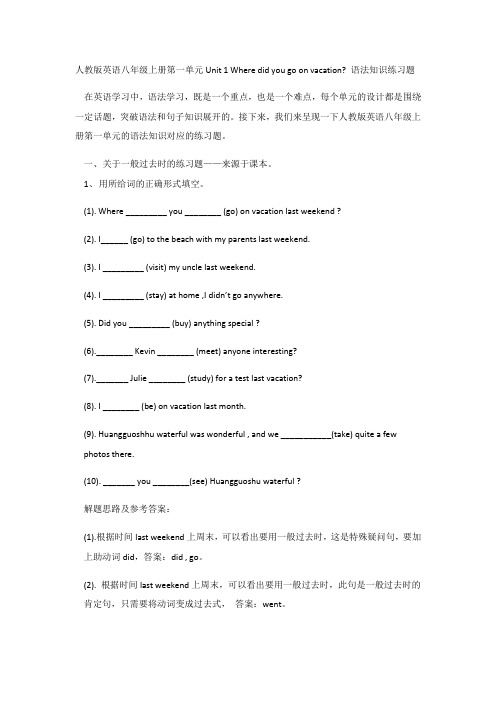
人教版英语八年级上册第一单元Unit 1 Where did you go on vacation? 语法知识练习题在英语学习中,语法学习,既是一个重点,也是一个难点,每个单元的设计都是围绕一定话题,突破语法和句子知识展开的。
接下来,我们来呈现一下人教版英语八年级上册第一单元的语法知识对应的练习题。
一、关于一般过去时的练习题——来源于课本。
1、用所给词的正确形式填空。
(1). Where _________ you ________ (go) on vacation last weekend ?(2). I______ (go) to the beach with my parents last weekend.(3). I _________ (visit) my uncle last weekend.(4). I _________ (stay) at home ,I didn’t go anywhere.(5). Did you _________ (buy) anything special ?(6).________ Kevin ________ (meet) anyone interesting?(7)._______ Julie ________ (study) for a test last vacation?(8). I ________ (be) on vacation last month.(9). Huangguoshhu waterful was wonderful , and we ___________(take) quite a few photos there.(10). _______ you ________(see) Huangguoshu waterful ?解题思路及参考答案:(1).根据时间last weekend上周末,可以看出要用一般过去时,这是特殊疑问句,要加上助动词did,答案:did , go。
八级英语上UnitWheredidyougoonvacation课时讲解及练习答案
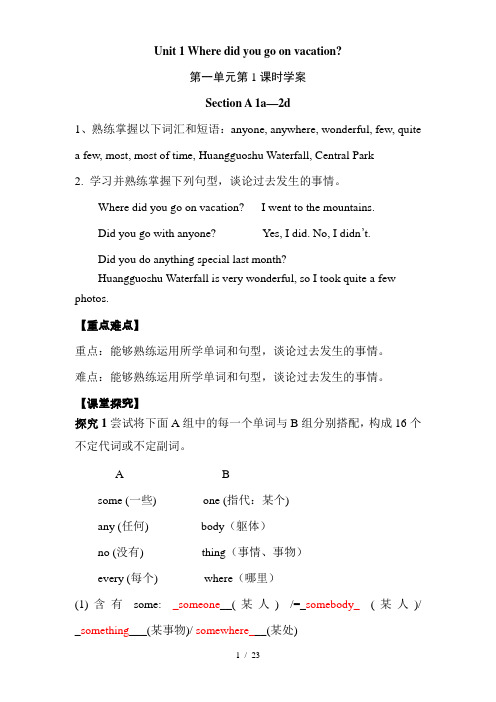
Unit 1 Where did you go on vacation?第一单元第1课时学案Section A 1a—2d1、熟练掌握以下词汇和短语:anyone, anywhere, wonderful, few, quitea few, most, most of time, Huangguoshu Waterfall, Central Park2. 学习并熟练掌握下列句型,谈论过去发生的事情。
Where did you go on vacation? I went to the mountains.Did you go with anyone? Yes, I did. No, I didn’t.Did you do anything special last month?Huangguoshu Waterfall is very wonderful, so I took quite a few photos.【重点难点】重点:能够熟练运用所学单词和句型,谈论过去发生的事情。
难点:能够熟练运用所学单词和句型,谈论过去发生的事情。
【课堂探究】探究1尝试将下面A组中的每一个单词与B组分别搭配,构成16个不定代词或不定副词。
A Bsome (一些) one (指代:某个)any (任何) body(躯体)no (没有) thing(事情、事物)every (每个) where(哪里)(1)含有some: _someone__(某人) /=_somebody_(某人)/ _something___(某事物)/ somewhere___(某处)some用于肯定句,那么,含some的不定代词或不定副词也用于___肯定句(2) 含有any: _anyone_ (任何人)/= _anybody_ (任何人)/ anything_ (任何事物)/ _anywhere_ (任何地方)any用于否定句,那么,含any的不定代词或不定副词也用于否定句。
Unit 1 Where did you go on vacation知识点归纳及练习
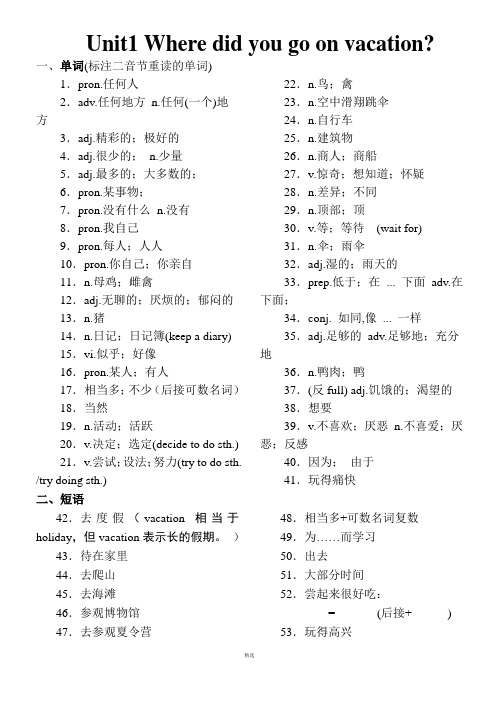
Unit1 Where did you go on vacation?一、单词(标注二音节重读的单词)1.pron.任何人2.adv.任何地方n.任何(一个)地方3.adj.精彩的;极好的4.adj.很少的;n.少量5.adj.最多的;大多数的;6.pron.某事物;7.pron.没有什么n.没有8.pron.我自己9.pron.每人;人人10.pron.你自己;你亲自11.n.母鸡;雌禽12.adj.无聊的;厌烦的;郁闷的13.n.猪14.n.日记;日记簿(keep a diary)15.vi.似乎;好像16.pron.某人;有人17.相当多;不少(后接可数名词)18.当然19.n.活动;活跃20.v.决定;选定(decide to do sth.)21.v.尝试;设法;努力(try to do sth. /try doing sth.)22.n.鸟;禽23.n.空中滑翔跳伞24.n.自行车25.n.建筑物26.n.商人;商船27.v.惊奇;想知道;怀疑28.n.差异;不同29.n.顶部;顶30.v.等;等待(wait for)31.n.伞;雨伞32.adj.湿的;雨天的33.prep.低于;在... 下面adv.在下面;34.conj. 如同,像... 一样35.adj.足够的adv.足够地;充分地36.n.鸭肉;鸭37.(反full) adj.饥饿的;渴望的38.想要39.v.不喜欢;厌恶n.不喜爱;厌恶;反感40.因为;由于41.玩得痛快二、短语42.去度假(vacation相当于holiday,但vacation表示长的假期。
)43.待在家里44.去爬山45.去海滩46.参观博物馆47.去参观夏令营48.相当多+可数名词复数49.为……而学习50.出去51.大部分时间52.尝起来很好吃:= (后接+ ) 53.玩得高兴54.当然55.给……的感觉;感受到:(后接+ )56.去购物57.在过去58.四处走走59.一碗…… 60.喝茶61.找出;查明62.继续63.去旅行64.照相65.上上下下66.出来;出版三、重点句式1.你买特别的东西了吗?Did you buy ?2.所有的东西尝起来真的很好吃!Everything tasted !3.你去哪里度假了?4.我为爸爸买了一些东西。
unit-1-Where-did-you-go-on-vacation知识总结
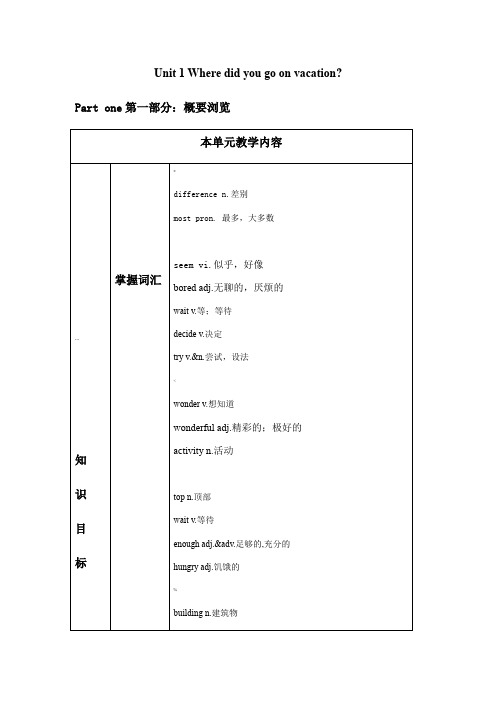
Unit 1 Where did you go on vacation? Part one第一部分:概要浏览)Part two 第二部分;知识点详解单词与短语讲解(一)quite a few的用法a few 意为“一些,若干(=some)”,后跟可数名词复数形式。
quite a few 意为“相当多;不少(=many)”后跟可数名词复数形式。
We took ____ ____ _____ _____ in the park last weekend.上周末,我们在公园里拍了相当多的照片。
【拓展】:few/a few/quite a few/little/a little/quite a little的用法1.most + 名词泛指多数,无范围most students大部分学生2.most + of + the (this/that/those/these等)+名词,指某一范围内的多数。
______ _____ _______students go to school by bike.这些学生们中的多数骑自行车去上学。
;(三)seem的用法seem“好像”,既可以后跟___________,又可以后跟___________。
【活学活用】1.The pig seems ___________(healthy/ healthily).2.Tom seemed ___________(know/ to know) the test result.3.I seem__________(have)a cold【拓展】(1.It seems+that从句看起来好像…;似乎….It seems that he is happy.=He seems _____ _____ happy. 他似乎很快乐。
2.seem like….好像,似乎…..It seems like a good idea.它似乎好像一个好主意。
整理后新目标人教版八年级上Unit 1 Where did you go on vacation知识点归纳及练习

Unit1 Where did you go on vacation?短语:1.go on vacation去度假Where did Tina go on vacation?vacation相当于holiday,但vacation表示长的假期。
3. go to the mountains去爬山go to the beach去海滩go to summer camp去参观夏令营4.visit museums 参观博物馆5..taste + adj. 尝起来…… It tastes delicious.6. .look+adj. 看起来…… You look great.7.quite a few相当多+可数名词复数We took quite a few photos there.8.study for为……而学习Did July study for tests?9.buy sth. for sb. / buy sb. sth.为某人买某物如:buy some books for me. = buy me some books.10. most of the time大部分时间I just stayed at home most of the time to read and relax.11.taste good尝起来很好吃Everything tasted really good!12.have a good time=have fun玩得高兴+v.ing Did everyone have a good time?The boys are going to have fun (in) drawing the pictures.13. tell sb. (not) to do sth. 告诉某人(不要)做某事My classmates told me to keep going, so I went14.feel like给……的感觉;感受到I feel/ felt like I was a bird.e up出来Twenty minutes later, the sun started to come out.16.in the past在过去I wonder what life was like here in the past.17.walk around四处走走I really enjoyed walking around the town.18.one bowl of… 一碗…… We only had one bowl of rice and some fish.19.find out找出;查明Someone looked at the map and found out we were not anywhere near the top.20.take photos照相21.up and down上上下下Everyone jumped up and down in excitement.22.nothing…but+动词原形除了……之外什么都没有I had nothing but a watch.I have nothing to do but watch TV all day long. 我整天除了看电视什么也没干。
人教版八年级上册英语 Unit 1 重要知识点配套练习题【附答案解析】
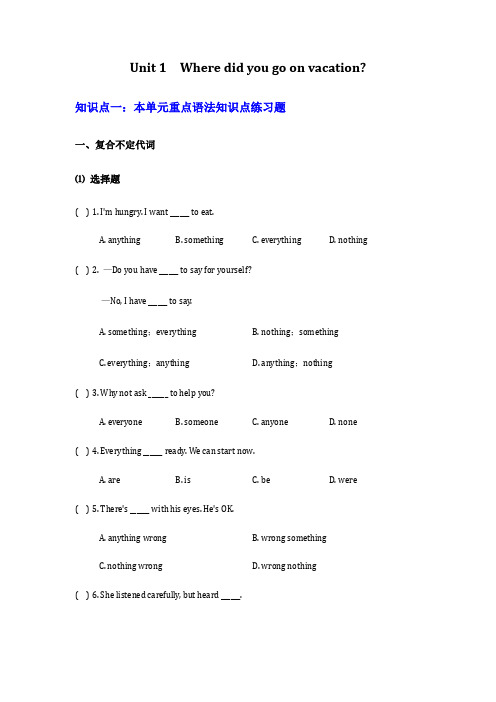
Unit 1 Where did you go on vacation?知识点一:本单元重点语法知识点练习题一、复合不定代词⑴选择题( ) 1. I'm hungry. I want ______ to eat.A. anythingB. somethingC. everythingD. nothing ( ) 2. —Do you have ______ to say for yourself?—No, I have ______ to say.A. something;everythingB. nothing;somethingC. everything;anythingD. anything;nothing( ) 3. Why not ask ______ to help you?A. everyoneB. someoneC. anyoneD. none ( ) 4. Everything ______ ready. We can start now.A. areB. isC. beD. were ( ) 5. There's ______ with his eyes. He's OK.A. anything wrongB. wrong somethingC. nothing wrongD. wrong nothing( ) 6. She listened carefully, but heard ______.A. anyoneB. SomeoneC. everyoneD. nothing( ) 7. Everything ______ good.A. beB. areC. isD. were⑵用适当的复合不定代词填空1.Listen, __________ is singing next door2.She didn't go there with __________ last week.Would you like __________ to eat?e here! I have __________ important to tell you.4.—Is __________ here?—Yes,all the students are here.二、一般过去式⑴句型转换1.Mary saw her English teacher just now.(改为否定句)__________________________________________________________________________________________________________ 2.Jack bought something special in the gift shop.(改为一般疑问句)__________________________________________________________________________________________________________ 3. We went to the movie yesterday.(对画线部分提问)__________________________________________________________________________________________________________ 4. Tony went to Tibet on vacation.(对画线部分提问)__________________________________________________________________________________________________________ 5. Danny visited the small town two years ago.__________________________________________________________________________________________________________5. Did you go to the movies with your parents last night? (作肯定/否定回答)⑵ 选择题1.—Where did you go last winter vacation?—I ________ to London with my family.A. goB. have goneC. wentD. was going2.He ________ me his name, but I can't remember it now.A. tellsB. toldC. will tellD. is telling3.—Wendy, how long have you had the Huawei P30 Pro?—A couple of days. I ________ it last week.A. boughtB. buyC. will buyD. have bought4. —What did you do the day before yesterday?—I ________ for an English test.A. is studyingB. studiedC. studyD. will study5. The teacher ________ why the boy was late for school again.A. madeB. wonderedC. waitedD. took知识点二:本单元重点单词变形练习题⑵ 用所给单词的适当形式填空1. Last month Jason ________________ (visit) his friend in Shanghai.2. Who ________________ (go)shopping with you yesterday?3. I made this red dress all by ________________ (me)4.After a few hours, we ________________ (arrive) at the beach.5.We stopped at the shop and ________________ (buy) some food.6.—Can we have some more bread?—Sure! Please help ________________ (you) !7.My mother had nothing to do but ________________ (watch) TV last night.8.The baby seemed ________________ (be) happy when he saw the little dog.9.The girl ________________ (not watch) TV last week.10.Everyone ________________ (be) here. Let's start the game.11.We have many ________________ (activity) after school, such as playing basketball and having dance lessons.12.Mike decides ________________ (tell) the story to her teacher13. There are some beautiful ________________ (build) in the neighborhood.13.There are many ________________ (different) between English names and Chinese names.14.All the students like Mr. Brown because he always makes his classes _____________ (enjoy).15.—What's the man's job?—He is a ________________ (trade).16.I was very sleepy. I tried ________________ (keep) my eyes open, but I couldn't⑵用方框中所给单词适当形式填空It is hot and wet in Chongqing these days. I 1.__________ the weather here but I love the food and the scenery (风景). This morning, it was rainy. We didn't have any special 2.__________ . My parents and I just stayed at the hotel and I felt really 3.__________ . Luckily, it stopped raining at noon. We went to eat 4. __________ special —Chongqing hotpot(火锅) for lunch. There is a big 5. __________ between Chongqing hotpot and Beijing hotpot. The food here is really spicy (辛辣的). After lunch, we 6. __________ to visit Foreigner Street in Chongqing 7. __________ the local people told us that it was a good place to visit. Foreigner Street is really 8. __________ ! There are lots of old buildings and nice food from all over the world. We 9. __________ Italian coffee, Indian cakes and British tea there. 10. __________was nice and we really had a good time in this street.I went to Hawaii last summer. It is a 1. __________ place. People from all over the world go there on 2. __________ every year. The weather 3. __________ nice during my stay. It was 4. __________ every day. It was my dream to see the sun going down there. So my family and I 5.__________ the sunset at the seaside(海边). I saw many people there. Some played on the beach and some 6. __________ in the sea. At night, people got together to have a party. We 7.__________ and danced. I had a great time there. In the past, it was difficult for travelers to go to Hawaii. And there were no big 8. __________ like the ones today. But now things have changed. It's easy for people to 9. __________ there and there are lots of nice big hotels. What do you think of the beautiful place? Would you like to pay a visit to Hawaii? I'm sure you,llenjoy 10.__________ here知识点三:本单元重点短语练习题⑴根据汉语提示完成句子1. 今年你想去夏令营吗?Do you want to ________________________ this year.2. 上个月你去哪里度假了?Where did you go ________________________ last month?3. 林涛周末喜欢待在家里。
Unit-1--Where-did-you-go-on-vacation-知识点汇总
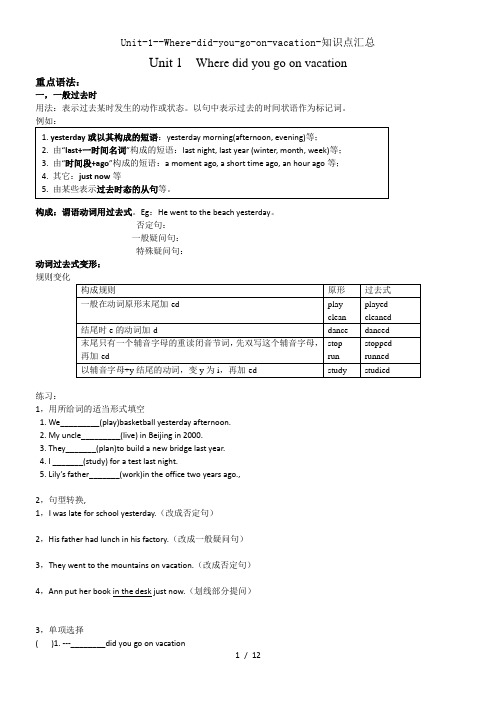
Unit 1 Where did you go on vacation 重点语法:一,一般过去时用法:表示过去某时发生的动作或状态。
以句中表示过去的时间状语作为标记词。
例如:构成:谓语动词用过去式。
Eg:He went to the beach yesterday。
否定句:一般疑问句:特殊疑问句:动词过去式变形:规则变化练习:1,用所给词的适当形式填空1. We_________(play)basketball yesterday afternoon.2. My uncle_________(live) in Beijing in 2000.3. They_______(plan)to build a new bridge last year.4. I _______(study) for a test last night.5. Lily’s father_______(work)in the office two years ago.,2,句型转换,1,I was late for school yesterday.(改成否定句)2,His father had lunch in his factory.(改成一般疑问句)3,They went to the mountains on vacation.(改成否定句)4,Ann put her book in the desk just now.(划线部分提问)3,单项选择( )1. ---________did you go on vacation---Hong Kong.A. WhatB. HowC. WhereD. When( )2. I_____my homework last night. I went to the cinema with my parents.A. didB. didn’tC. didn’t doD. don’t do( )3. ---Did they clean the house yesterday afternoon---_________. They cleaned it this morning.A. No, they don’tB. Yes, they didC. No, they didn’t C. Yes, they do( )4. ---_____Tom and Jim_____a walk yesterday evening---No, they____.A. Do; take; doesn’tB. Did; take; didn’tC. Did; take; didD. Do; take; don’t ( )5. ---The coat looks good on you. Where______you______it---In a supermarket.A. do; buyB. did; buyC. will; buyD. does; buy二、复合不定代词Did you go with anyone Did you find anything special用法:1,作主语时,谓语动词用单数Everone (be)here.2, 被形容词修饰时,形容词必需后置。
Where did you go on vacation单元归纳及习题

Unit 5 Where did you go on vacation?一、短语归纳1. go on vacation 去度假2. stay at home 待在家里3. go out 出去4. go to summer camp 去参加夏令营5. study for tests 为测验而学习6. quite a few 相当多7. most of the time 大部分时间8. have a good time doing=have fun doing =enjoy oneself 玩得高兴9. of course=sure =certainly 当然10. keep a diary 记日记11. feel like 给……的感觉;感受到12. in the past 在过去13. walk around 四处走走14. walk up to 走向…15. because of+名词短语because+句子因为16. the next day 第二天17. find out 找出;查明18. go on 继续19. come up 升起;出来come out 出版发行20. another two hours 又两个小时二、重点固定搭配和句型1. stop doing sth. 停止做某事2. taste / look/sound/smell good.尝起来/看起来/听起来/闻起来不错3. nothing…but+动词原形除了……之外什么都没有4. seem+(to be)+ adj. 看起来……5.arrive in+大地点/ arrive at+小地点6. decide to do sth. 决定去做某事7. try doing sth. 尝试做某事8. forget doing sth. 忘记做过某事forget to do sth. 忘记做某事9. enjoy doing sth. 喜欢做某事11. start doing sth. 开始做某事13. dislike doing sth. 不喜欢做某事14. keep doing sth. 继续做某事keep on doing sth 不停做某事15. Why not do. sth.=why don’t you do sth 为什么不做……呢?16. so+adj.+that+从句如此……以至于……17. tell sb. (not) to do sth. 告诉某人(不要)做某事18.enough +名词,形容词+enough20.seem to do sth 似乎好像做某事It seems/ seemed (that)…看起来好像……22. How do you like …=What do you think of…=What do you think about…你认为…怎么样?三、语法I.复合不定代词复合不定代词是由some, any, no, every加-body,-thing,-one构成,列表如下:Somebody 某人Someone 某人Something 某物,某事 Anybody 任何人Anyone 任何人Anything 任何事物Nobody 没有人No one 没有人Nothing 没有东西 Everybody 每人Everyone 每人Everything 一切1.复合不定代词若作主语,其谓语动词一般用单数.I am new here, so nobody knows me. 我是新来的,因此没人认识我。
Unit_1_where_did_you_go_on_vacation知识点详解
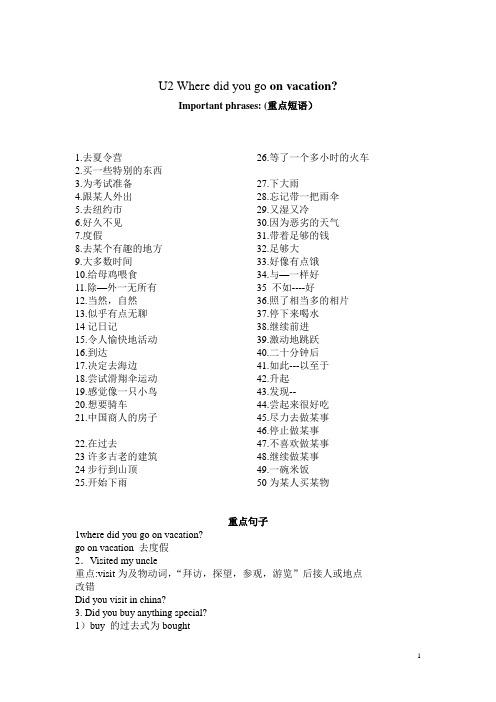
U2 Where did you go on vacation?Important phrases: (重点短语)1.去夏令营2.买一些特别的东西3.为考试准备4.跟某人外出5.去纽约市6.好久不见7.度假8.去某个有趣的地方9.大多数时间10.给母鸡喂食11.除—外一无所有12.当然,自然13.似乎有点无聊14记日记15.令人愉快地活动16.到达17.决定去海边18.尝试滑翔伞运动19.感觉像一只小鸟20.想要骑车21.中国商人的房子22.在过去23许多古老的建筑24步行到山顶25.开始下雨26.等了一个多小时的火车27.下大雨28.忘记带一把雨伞29.又湿又冷30.因为恶劣的天气31.带着足够的钱32.足够大33.好像有点饿34.与—一样好35 不如----好36.照了相当多的相片37.停下来喝水38.继续前进39.激动地跳跃40.二十分钟后41.如此---以至于42.升起43.发现--44.尝起来很好吃45.尽力去做某事46.停止做某事47.不喜欢做某事48.继续做某事49.一碗米饭50为某人买某物重点句子1where did you go on vacation?go on vacation 去度假2.Visited my uncle重点:visit为及物动词,“拜访,探望,参观,游览”后接人或地点改错Did you visit in china?3. Did you buy anything special?1)buy 的过去式为boughtbuy sth.for sb.=buy sb sth.我为Tom买了一个礼物2)anything 不定代词“某物,某事”主要用于疑问句和否定句中一旦anything用于可定句中,则意为“任何事,任何东西”Eg You can ask me anything you want to know3)★形容词修饰不定代词要后置4.Oh,did you go anything interesting?这是一般过去时中不含was/were的句子在变一般疑问句时,需用助动词did。
Unit1Where did you go on短语句型知识点总结与练习(含答案)人教版八年级上册
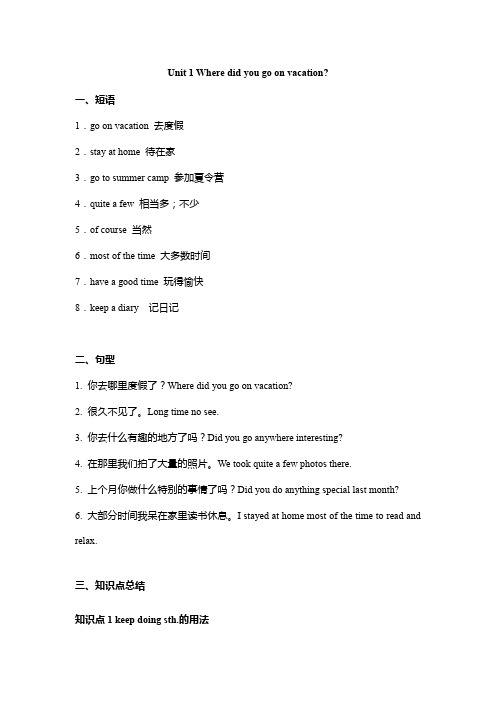
Unit 1 Where did you go on vacation?一、短语1.go on vacation 去度假2.stay at home 待在家3.go to summer camp 参加夏令营4.quite a few 相当多;不少5.of course 当然6.most of the time 大多数时间7.have a good time 玩得愉快8.keep a diary 记日记二、句型1. 你去哪里度假了?Where did you go on vacation?2. 很久不见了。
Long time no see.3. 你去什么有趣的地方了吗?Did you go anywhere interesting?4. 在那里我们拍了大量的照片。
We took quite a few photos there.5. 上个月你做什么特别的事情了吗?Did you do anything special last month?6. 大部分时间我呆在家里读书休息。
I stayed at home most of the time to read and relax.三、知识点总结知识点1 keep doing sth.的用法keep doing sth.相当于keep on doing sth.,表示“继续/一直/反复做某事”。
.keep sb.doing sth.让某人一直做某事keep sb.from doing sth.阻止某人做某事知识点2 so、such...that....的用法so+形容词/副词原级+that从句so+形容词+a/an+可数名词单数+that从句so+many/few+可数名词复数+that从句so+much/little+不可数名词+that从句such+a/an+形容词+可数名词单数+that从句such+形容词+可数名词复数+that从句such+形容词+不可数名词+that从句知识点3 few,a few与little,a little的辨析few意为“不多,很少”,表否定意义,修饰可数名词复数;a few意为“几个,一些”,表肯定意义,修饰可数名词复数;little意为“几乎没有”,表否定意义,修饰不可数名词;a little意为“有一点儿”,表肯定意义,修饰不可数名词。
新人教版八年级英语上册Unit1:Where-did-you-go-on-vacation?知识讲解和练习题
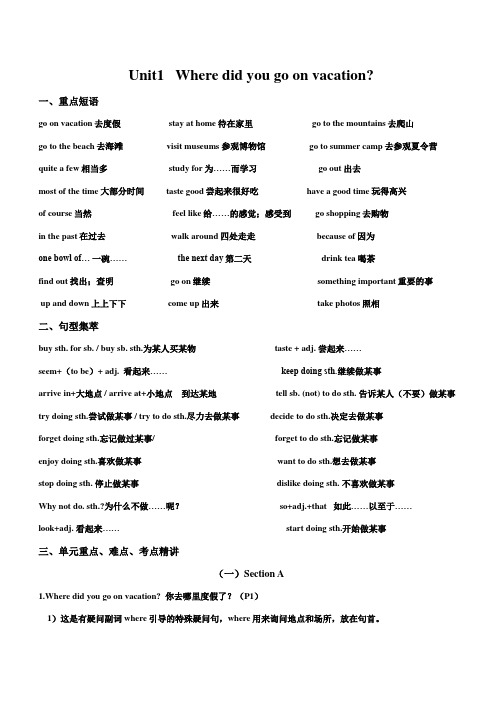
Unit1 Where did you go on vacation?一、重点短语go on vacation去度假 stay at home待在家里 go to the mountains去爬山go to the beach去海滩 visit museums 参观博物馆 go to summer camp去参观夏令营quite a few相当多 study for为……而学习 go out出去most of the time大部分时间 taste good尝起来很好吃 have a good time玩得高兴of course当然 feel like给……的感觉;感受到 go shopping去购物in the past在过去 walk around四处走走 because of因为one bowl of… 一碗…… the next day第二天 drink tea喝茶find out找出;查明 go on继续 something important重要的事up and down上上下下 come up出来 take photos照相二、句型集萃buy sth. for sb. / buy sb. sth.为某人买某物 taste + adj. 尝起来……seem+(to be)+ adj. 看起来…… keep doing sth.继续做某事arrive in+大地点 / arrive at+小地点到达某地 tell sb. (not) to do sth. 告诉某人(不要)做某事try doing sth.尝试做某事 / try to do sth.尽力去做某事 decide to do sth.决定去做某事forget doing sth.忘记做过某事/ forget to do sth.忘记做某事enjoy doing sth.喜欢做某事 want to do sth.想去做某事stop doing sth. 停止做某事 dislike doing sth. 不喜欢做某事Why not do. sth.?为什么不做……呢? so+adj.+that 如此……以至于……look+adj. 看起来…… start doing sth.开始做某事三、单元重点、难点、考点精讲(一)Section A1.Where did you go on vacation? 你去哪里度假了?(P1)1)这是有疑问副词where引导的特殊疑问句,where用来询问地点和场所,放在句首。
Unit_1_Where_did_you_go_on_vacation?单元知识点和练习题

Unit 1 Where did you go on vacation?一、知识点1. go on (a) vacation 去度假:be on (a)vacation 在度假/take a vacation休假2. go to the mountains去爬山go the beach 去沙滩go to the summer camp 去夏令营3.go+V-ing意为“去…”,多用于进行体育活动和业余娱乐活动,总结:go shopping/ go fishing/ go skating/ go swimming/ go camping/ go boating/ go hiking4. stay vi.停留,逗留,待在stay at home待在家里/ stay up (late)深夜不睡/熬夜5. most pron.大多数Most of后面的名词前要用冠词,人称代词用宾格;做主语时,of后的名词是复数,后面的谓语动词用复数;of后的名词是单数,后面的谓语动词用单数,如:Most of us like learning English. Most of the apples are delicious. / Most of the apple is bad.6. buy sth. for sb.(=buy sb. sth.)给某人买某物,如:I bought a pair of new glasses for my mother.=7. How do you think of….?你认为……怎么样?例如:你认为这个电影/这本书/这个国家/这个故事怎么样?=what do you think of …?/How do you feel about….?8 ed 和ing 结尾的动词9. seem好像,似乎,看起来①主语+seem to do sth. Your father seems to like playing tennis very much.(变否定句)②主语+seem (to be)+adj. The classroom seems (to be) very clean.③It seems +that从句It seems that it will snow soon./ It seems that you are not happy today.10. problem大的问题,难题,需要用行动解决;question因疑惑而提出的,需要口头回答。
Unit1 Where did you go on重点知识点讲解练习(含答案)人教版英语八年级上册
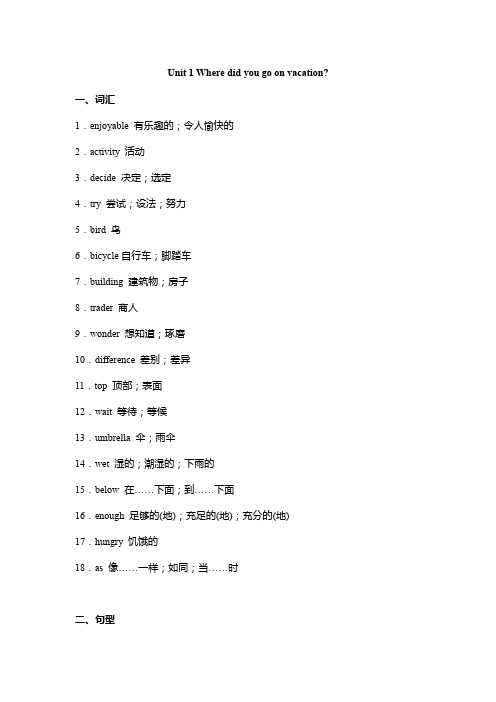
Unit 1 Where did you go on vacation?一、词汇1.enjoyable 有乐趣的;令人愉快的2.activity 活动3.decide 决定;选定4.try 尝试;设法;努力5.bird 鸟6.bicycle自行车;脚踏车7.building 建筑物;房子8.trader 商人9.wonder 想知道;琢磨10.difference 差别;差异11.top 顶部;表面12.wait 等待;等候13.umbrella 伞;雨伞14.wet 湿的;潮湿的;下雨的15.below 在……下面;到……下面16.enough 足够的(地);充足的(地);充分的(地) 17.hungry 饥饿的18.as 像……一样;如同;当……时二、句型1. 你认为三亚怎么样?How did you like Sanya? = What did you think of Sanya?2. 我给父母买了一些东西,但是什么也没给自己买。
I bought something for my parents, but nothing for myself.3. 你为什么不给自己买点东西呢?Why didn‘t you buy anything for yourself? = Why not buy anything for yourself?4. 我真的没有看到我喜欢的东西。
I didn‘t really see anything I liked.5. Still no one seemed to be bored. 似乎仍然没有人觉得无聊。
三、重点知识点讲解1.enough的用法enough作形容词,意为“足够的;充分的”,常用来修饰复数名词或不可数名词,多放在名词前面;作副词,意为“充分地;足够地”,用来修饰形容词或副词,要放在所修饰词之后。
2.rain、rainy、raining辨析rain:名词,雨;动词,下雨(动词原形)rains:动词第三人称单数.表示一个地区常常下雨,用来形容一个地方气候多雨.raining:动词现在进行时rainy:形容词,多雨的.3.wait 的用法wait for等待,等候; 观望形势后再作决定,见风使舵; 〈非正〉推迟(用餐)直到(某人)到达wait in line 排队can’t wait to do sth.迫不及待地要做某事。
2019-2020学年度第一学期八年级英语Unit1 Where did you go on vacation重要语言点讲解与练习

一.短语读读背背。
1. vacation相当于holiday,但vacation表示长的假期。
2. something interesting有趣的东西3. in excitement 兴奋地4.go on vacation去度假5.stay at home待在家里6.go to the mountains去爬山7.go to the beach去海滩8.visit museums 参观博物馆9.go to summer camp去参观夏令营10.quite a few相当多11.study for为……而学习12.go out出去13.most of the time大部分时间14.taste good尝起来很好吃15.have a good time玩得高兴16.of course当然17.feel like给……的感觉;感受到18.go shopping去购物19.in the past在过去20.walk around四处走走21.because of + 名词/代词/名短因为because +从句因为22.one bowl of… 一碗……23.the next day第二天24.drink tea喝茶25.find out找出;查明26.go on继续27.take photos照相28.something important重要的事29.up and down上上下下30.come up出来31.buy sth. for sb. / buy sb. sth.为某人买某物32.taste + adj. 尝起来……33.look +adj. 看起来……34.nothing…but+动词原形除了…之外什么都没有35.seem+(to be)+ adj. 看起来……36.arrive in+大地点/ arrive at+小地点到达某地37.decide to do sth.= make a decision to do sth决定去做某事decide not to do sth. 决定不去做某事= make a decision not to do sth. 决定不去做某事38. decide on doing sth. 决定做某事39.try doing sth.尝试做某事try to do sth.尽力去做某事40.forget doing sth.忘记做过某事41.forget to do sth.忘记做某事42.enjoy doing sth.喜欢做某事43.want to do sth.想去做某事44.start doing sth.开始做某事45.stop doing sth. 停止做某事46.dislike doing sth. 不喜欢做某事47.keep doing sth.继续做某事48.Why not do. sth.?为什么不做……呢?49.so+ adj.+that+从句如此……以至于……50.tell sb. (not) to do sth. 告诉某人(不要)做某事51.most of the time 大多数时间52. ride bicycles 骑自行车53.long time no see 好久不见54.enjoyable activities 令人愉快的活动55. try paragliding 尝试滑翔伞运动56.the top of the hill 山顶57.feed(fed) hens and pigs 喂鸡和猪58.wonder at sth. 感到疑惑59. wonder to do sth. 想知道60. seem to do sth. 好像做某事二.学一学语法运用。
八年级上册Unit-1-Where-did-you-go-on-vacation知识点及习题

Unit 1 Where did you go on vacation?一、考点短语(共24个)二、考点句型(共14个)三、考点语法(共10个)考点1、复合不定代词P2 Did you go anywhere interesting?考察方式:单选、阅读理解、短文填空、完成对话、书面表达成功试题1.〖2014 福建厦门22〗------- Is here?------- No. Kate is ill in hospital.A. SomeoneB. AnyoneC. everyone2.〖2012 杭州18〗You look worried! Is all right?A. somethingB. anythingC. everythingD. nothing3. 〖2015 广安29〗---- Would you like to eat?---No, thanks.A.nothingB.somethingC.anything4. 〖2014 昆明36〗------- Where would you like to go this Mid-Autumn Festival?------- I’d like to go .A.everywhere relaxingB. somewhere relaxingC. Peaceful anywhereD.peaceful somewhere5.〖2004 安徽芜湖〗------- The exam was very easy, wasn’t it?------- Yes, but I don’t think could pass it.A.somebodyB. anybodyC. nobodyD. everybody6.I agree with most of what you said, but I don’t agree with .A. nothingB. everythingC. somethingD. anything7. She rose from being a nobody to become a superstar.A. a famous personB. an unknown personC. an important person8. 〖2013 河南31〗He thinks himself somebody, but we think him .A.nobodyB. anybodyC. somebodyD. Everybody考点2、a few, few Vs. A little, littleBut then it started raining a little so we decided to take the train. 考察方式:单选、完形、短文填空一、词性:1、adv. (4个)e.g. A little cute2、adj.(4个) ①②3、n. (4个) ① a few / few :指代② a little /little :二、考点:(当 a few, few, a little, little 为形容词时)三、解题步骤成功试题1. Each of us has life goals, which will guide us to a bright future. Without life goals, we may waste our lifetime.A. a littleB. fewC. a few2.Jessica never speaks to strangers because she is shy.A. a fewB. a littleC. a bit of3. The girl in purple is new here, so people know her.A. fewB. a fewC. littleD. a little4.His life is full of exams and studies on weekdays. He has free time.A. fewB. a fewC. muchD. little5. 〖2013 广州21〗There is news about this movie star in the newspaper. Where can I getsome?A. manyB. a fewC. a lotD.little6. We’d better wait more minutes. I think Jeff will come soon.A. a fewB. fewC. a littleD.little7. 〖2013 沈阳13〗It is good for the fish to have water plants in the tank (鱼缸) to keep the water pure.A. littleB. a littleC. fewD. a few考点3、enough 的考点 (2个)原文重现:My father didn ’t bring enough money, so only had one bowl of rice and some fish.考查方式:单选、完成对话、书面表达成功试题1. He is to make money to support his parents.A. old enoughB. enough oldC. young enoughD. enough young2. Bill has to help others.A.money enoughB. houses enoughC. enough money3. The door is not for some big elephants to pass.A.wide enoughB. widely enoughC.enough wideD. enough widely4. 〖2014 乌鲁木齐 33〗-------Can you understand me, Tony?-------Yes, madam. You speak . I can follow you.A. enough clearB. clear enoughC. enough clearlyD. clearly enough考点4:decide 的考点原文重现: It was sunny and hot, so we decided to go to the beach near our hotel. 考查方式:单选、完形、书面表达【活学活用】1)他决定在周末去游泳。
- 1、下载文档前请自行甄别文档内容的完整性,平台不提供额外的编辑、内容补充、找答案等附加服务。
- 2、"仅部分预览"的文档,不可在线预览部分如存在完整性等问题,可反馈申请退款(可完整预览的文档不适用该条件!)。
- 3、如文档侵犯您的权益,请联系客服反馈,我们会尽快为您处理(人工客服工作时间:9:00-18:30)。
2013年新人教版初二英语上册Unit1 Where did you go on vacation? 知识讲解和练习题一、重点短语go on vacation去度假stay at home待在家里go to the mountains去爬山go to the beach去海滩visit museums 参观博物馆go to summer camp去参观夏令营quite a few相当多study for为……而学习go out 出去most of the time大部分时间taste good尝起来很好吃have a good time玩得高兴of course当然feel like给……的感觉;感受到go shopping 去购物in the past在过去walk around四处走走because of因为one bowl of… 一碗…… the next day第二天drink tea喝茶find out找出;查明go on继续something important重要的事up and down上上下下come up出来take photos照相二、句型集萃buy sth. for sb. / buy sb. sth.为某人买某物taste + adj. 尝起来…… seem+(to be)+ adj. 看起来……keep doing sth.继续做某事arrive in+大地点/ arrive at+小地点到达某地tell sb. (not) to do sth. 告诉某人(不要)做某事try doing sth.尝试做某事/ try to do sth.尽力去做某事decide to do sth.决定去做某事forget doing sth.忘记做过某事/ forget to do sth.忘记做某事enjoy doing sth.喜欢做某事want to do sth.想去做某事stop doing sth. 停止做某事dislike doing sth. 不喜欢做某事Why not do. sth.?为什么不做……呢?so+adj.+that 如此……以至于……look+adj. 看起来……start doing sth.开始做某事三、单元重点、难点、考点精讲(一)Section A1.Where did you go on vacation? 你去哪里度假了?(P1)1)这是有疑问副词where引导的特殊疑问句,where用来询问地点和场所,放在句首。
a._____ do you _____ ______?你从哪里来?b._____does he______?他住在哪里?2)go on vacation意为“去度假”。
I want ____ ____ ____ ____in Hainan this winter.今年冬天我想去海南度假。
2.visited my uncle 看望了我的叔叔(P1)visit是及物动词,意为“拜访;探望”,后接表示人的名词或代词。
visit还可以意为“参观;游览”,后接表示地点的名词。
a.I visited my grandmother last week. 上周我去______了我的外婆。
b.Do you want to visit Shanghai? 你想______上海吗?拓展:visitor意为“参观者;游客”。
eg: These visitors come from America._______________________3.buy anything special 买特别的东西。
(P2)1)buy及物动词,意为“买;购买”。
其过去式为______。
拓展:buy sth. for sb.=buy sb. sth. 意为“给某人买某物”。
My uncle_____ _____a bike.= My uncle_____ _____for me.2)anything不定代词,意为“某事;某件东西”,主要用于疑问句或否定句中。
a.Do you want anything from me?b.I can’t say anything about it.3) anthing special表示“特别的东西”,形容词修饰不定代词时后置。
a. Is there________ ________in this book?这本书里有新的内容吗?4.Oh, did you go anywhere interesting?哦,你去有趣的地方了吗?(P2)1)本句是did开头的一般疑问句2)anywhere用作副词,意为“在任何地方”。
eg:Did you go anywhere during the summer vacation?辨析:anywhere与somewhereanywhere意为“在任何地方”,常用于否定句和疑问句中。
eg:I ca n’t find it anywhere.somewhere意为“在某处;到某处”,常用于肯定句中。
eg:I lost my key somewhere near here.5.We took quite a few photos there.我们在那里拍了不少照片。
(P2)take photos 意为“照相;拍照”。
eg:We______ ______on the Great Wall.我们在长城上照了相。
辨析:quite a few与quite a littlequite a few 意为“很多;不少”,修饰可数名词复数;quite a little 意为“很多;不少”,修饰不可数名词。
a. He stays here for _____ _____ _____days.b.There is _____ _____ _____water in the bottle(瓶子).6. I just stayed at home most of the time to read and relax. 我大部分时间只是待在家里读书休息。
(P2)most of the time意为“大部分时间”,其中most为代词,意为“大部分;大多数”。
拓展:most of…意为“……中的大多数”,它作主语时,谓语动词取决于most of后所修饰的名词。
a. Most of us_____(be)going to the park. 我们大多数人要去公园。
b. Most of the food_____(go)bad. 大部分的食物都变质了。
7.Everything tasted really good!所有的东西尝起来真的很好吃!(P3)taste在此为系动词,意为“尝起来”,其后接形容词构成系表结构。
a.The food tastes really great.食物尝起来棒极了。
8. Did everyone have a good time?大家都玩得很开心吗?(P3)have a good time = enjoy oneself = have fun 玩得开心(+ doing)eg: We had a good time visiting the the Great Wall.= We enjoyed ourselves visiting the the Great Wall.= We had fun visiting the the Great Wall.9.How did you like it? 你觉得它怎么样?(P3)How do/did you like……?意为“你觉得……怎么样?”,用来询问对方的观点或看法,相当于What do you think of……?eg: How do you like your new job?= _____ _____ _____ _____ your new job?10.Did you go shopping? 你们去购物了吗?(P3)go shopping意为“去购物;去买东西”,同义短语为do some shopping.eg: I usually go shopping on Sundays.我通常星期天去购物。
拓展:“go+doing”形式表示“去做某事”,常用于表达从事某一体育活动或休闲活动。
go skating 去滑冰go hiking 去远足go sightseeing 去观光go fishing 去钓鱼go swimming 去游泳go boating 去划船11.I went to a friend’s farm in the countryside with my family.我和家人一起去了乡下一个朋友的农场。
(P3)a friend’s farm是名词所有格形式。
一般情况下,表示“有生命的人或物”的名词后面加’s,表示所属关系。
eg:The red bike is Alice’s.那辆红色的自行车是爱丽斯的。
拓展:名词所有格的构成:1)单数名词词尾加’s,复数名词词尾没有s,也要加’sthe girl ‘s pen女孩的钢笔women’s shoes女鞋on Children’s Day 2)复数名词以s结尾的只加’the students’ readin g room学生阅览室Teachers’ Day教师节3)如果两个名词并列,并且分别有’s,则表示“分别有”;只后一个名词有一个’s,则表示“共有”:John’s and Kate’s rooms. 约翰和凯特(各自)的房间。
Lily and Lucy’s father. 莉莉和露西的爸爸(同一个爸爸)。
4)表示无生命的名词一般以...of...构成短语,表示所有关系。
a map of China一幅中国地图the name of the story那个故事的名字12. Still no one seem ed to be bored. (即使这样)仍然没有人看起来无聊。
(P3)1)seem意为“好像;似乎;看来”。
eg:Everything seems easy.一切似乎很容易。
拓展:a. seem+adj. “看起来……”。
You seem happy today.你今天看起来很高兴。
b. seem+to do sth. “似乎,好像做某事”。
I seem to have a cold.我似乎感冒了。
c. It seems/seemed+从句“看起来好像…;似乎…”。
It seems that no one believes you.看起来好像没有人相信你。
2)辨析:bored与boringa. bored意为“厌烦的;感到无聊的”,一般在句中修饰人。
